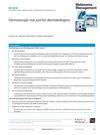 73 citations,
July 2016 in “Cosmetics”
73 citations,
July 2016 in “Cosmetics” Mushrooms have beneficial properties for skin and hair care products and have great potential for future cosmetic use.
[object Object]  29 citations,
June 2014 in “Drug delivery”
29 citations,
June 2014 in “Drug delivery” The new formulation improved the skin absorption of the drug Thiocolchicoside.
 22 citations,
January 2015 in “Actas dermo-sifiliográficas/Actas dermo-sifiliográficas”
22 citations,
January 2015 in “Actas dermo-sifiliográficas/Actas dermo-sifiliográficas” Platelet-rich plasma might help with skin aging, ulcers, and hair loss, but more research is needed to prove its effectiveness and safety.
 10 citations,
February 2015 in “Melanoma management”
10 citations,
February 2015 in “Melanoma management” Dermoscopy is useful for many health professionals, not just dermatologists, in improving skin condition diagnoses and reducing unnecessary biopsies.
6 citations,
March 2022 in “International journal of molecular sciences” Natural skincare products may help reduce sun damage and support the skin's daily cycle.
 3 citations,
October 2023 in “Military Medical Research/Military medical research”
3 citations,
October 2023 in “Military Medical Research/Military medical research” Regulatory T cells help heal skin and grow hair, and their absence can lead to healing issues and hair loss.
 2 citations,
August 2023 in “Pharmaceutics”
2 citations,
August 2023 in “Pharmaceutics” New skin disease treatments using TDDS are improving but face challenges like side effects and high costs.
 1 citations,
January 2023 in “IEEE access”
1 citations,
January 2023 in “IEEE access” Deep learning helps detect skin conditions and is advancing dermatology diagnosis and treatment.
January 2025 in “International Journal of Molecular Sciences” Non-liganded Vitamin D Receptor is crucial for healthy skin and hair.
 August 2024 in “Quality in Sport”
August 2024 in “Quality in Sport” PRP helps with skin, hair, and wound treatments but needs more research for standard use.

Plasma gel and PRP treatments improve skin and hair with minimal side effects.

Proretinal nanoparticles are a safe and effective way to deliver retinal to the skin.
 June 2015 in “Biomedical and biopharmaceutical research”
June 2015 in “Biomedical and biopharmaceutical research” The congress showed advancements in skin hydration, barrier function, and safe, effective new cosmetic formulations.
January 2023 in “Pharmaceutics” AA–TF#15 significantly promotes hair regrowth and could be an effective treatment for androgenic alopecia.
 27 citations,
December 2014 in “Current problems in dermatology”
27 citations,
December 2014 in “Current problems in dermatology” Photodynamic therapy is the preferred treatment for skin precancer due to its effectiveness and safety.
 8 citations,
June 2022 in “Cosmetics”
8 citations,
June 2022 in “Cosmetics” Coffee berry extract may help slow skin aging and prevent hair loss.
 20 citations,
July 2013 in “International Journal of Dermatology”
20 citations,
July 2013 in “International Journal of Dermatology” Obesity increases the risk of skin infections, inflammatory conditions, and melanoma, but not basal cell carcinoma.
4 citations,
November 2022 in “Nutrients” Cow placenta extract has strong antioxidant effects and can delay skin aging in mice.
 4 citations,
February 2022 in “Nutrients”
4 citations,
February 2022 in “Nutrients” Korean Red Ginseng saponins may protect skin from inflammation and darkening caused by air pollution.
 32 citations,
January 2022 in “International Journal of Molecular Sciences”
32 citations,
January 2022 in “International Journal of Molecular Sciences” Melatonin, a hormone, can help protect skin from aging by reducing stress, inflammation, and damage, and may also help treat hair loss in women.
 15 citations,
June 2019 in “Experimental Dermatology”
15 citations,
June 2019 in “Experimental Dermatology” Old neuropharmacological drugs might be effective for treating inflammatory skin diseases.
 4 citations,
July 2017 in “Archivum Immunologiae et Therapiae Experimentalis”
4 citations,
July 2017 in “Archivum Immunologiae et Therapiae Experimentalis” Retinol may affect immune responses in people with frequent skin boils.
 October 2023 in “Plant Archives/Plant archives”
October 2023 in “Plant Archives/Plant archives” Hibiscus rosa-sinensis is effective and safe for use in herbal soaps and hair oils, promoting skin and hair health.
[object Object]  2 citations,
September 2016 in “Springer eBooks”
2 citations,
September 2016 in “Springer eBooks” Humans can accurately guess age from faces, with women being slightly better at it, and age perception is linked to evolutionary factors.
 October 2021 in “Journal of Investigative Dermatology”
October 2021 in “Journal of Investigative Dermatology” Skin cell strength decreases significantly as we age.
67 citations,
May 2016 in “Journal of Cosmetic Dermatology” Peptides, proteins, and growth factors in skincare show promise for improving skin health.
 1 citations,
October 2022 in “JCI insight”
1 citations,
October 2022 in “JCI insight” Deleting the BRD4 protein in certain skin cells causes hair loss and skin inflammation.
January 2024 in “Cosmetics” Menopause worsens skin, hair, and nails, affecting self-esteem and quality of life.
 July 2023 in “Jurnal Ilmu Kesehatan Hewan”
July 2023 in “Jurnal Ilmu Kesehatan Hewan” Sulfur-based treatments combined with simparica effectively treat scabies in puppies.
 April 2023 in “Journal of Investigative Dermatology”
April 2023 in “Journal of Investigative Dermatology” Long-term Imiquimod treatment causes initial skin inflammation that lessens over time, and topical corticosteroids reduce this inflammation and cytokines in a mouse model of psoriasis.
























